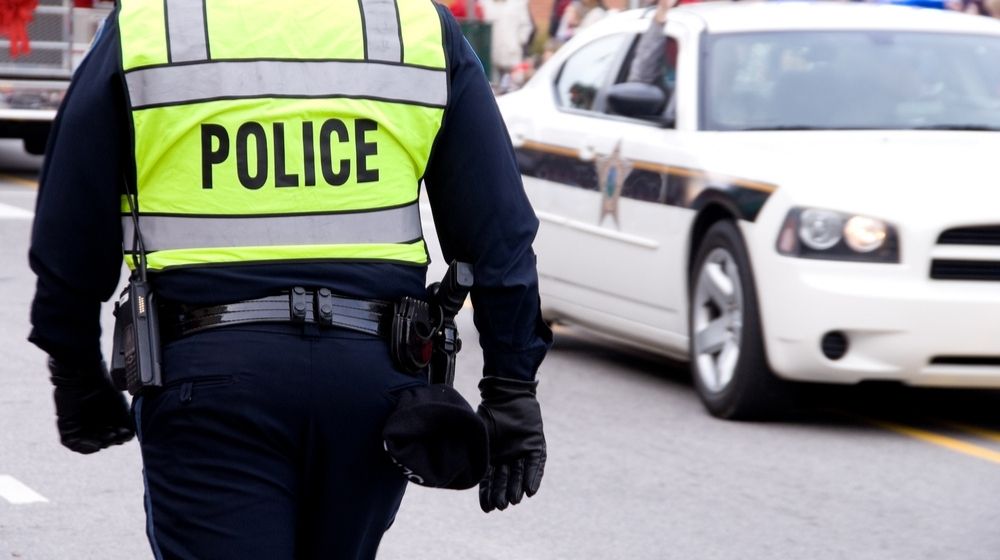Breaking News
New Oklahoma State Bill Would Allow Cities to Paint Blue Lines on Streets to Support Law Enforcement

A bill making its way through the state Legislature of Oklahoma would enable cities and towns to establish ordinances permitting the painting of blue lines on streets and the display of signage as a way to recognize and support law enforcement.
The legislators sponsoring the measure are former longtime law enforcement officers. They say their intent is as simple as the bill's language.
“Not to put any mandate on them, but just to be able, if you wanted to recognize your officers … just to say, look, we appreciate you,” said Sen. Darrell Weaver, R-Moore, who authored SB 834. “That is really it. Sounds pretty innocent, but really that is the reason I ran the bill.”
Weaver spent nearly 30 years with the Oklahoma Bureau of Narcotics & Dangerous Drugs Control before retiring in 2015 as the agency's director.
He was elected to the state Senate in 2018. He first offered the measure allowing the painting of blue lines in 2019. Last year the bill, like many others, never made it to the floor because of COVD-19.
“Historically, a lot has happened in the world since then, but this is really just simply a bill that I wanted to run – nobody asked me to run it – it just came from who I am,” Weaver said.
“Black Lives Matter” signs appeared on city streets across the country last year, including in Tulsa. They came in the wake of the killing of George Floyd by a Minneapolis police officer. Weaver said his proposal of allowing blue lines is in no way a response to those protests.
“For me, it was just having spent a lot of time in law enforcement,” he said. “I just wanted to do that … other people are worthy of other things, and I don't discount that. But I think this was something that I could do for my profession that I had spent many years in, and that is really the motive.”
Weaver said under the proposed legislation, cities could paint only blue lines on streets to recognize officers. He added that the bill would not authorize cities to permit anyone else to place messages on streets.
State Rep. Ross Ford, R-Broken Arrow, is sponsoring the measure in the House. He served on the Tulsa Police Department for 27 years.
“I think it is important for the community to show support to our law enforcement officers,” Ford said. “They are the front line of keeping us safe and secure in our neighborhoods and in our cities. And so all this bill does is just allow the cities, if they want to, they can paint a blue stripe.”
Ford said he has heard from several communities that have expressed interest in finding a way to show they support law enforcement.
“In my community, Broken Arrow … if this would have come about earlier, they would have painted all the bike lanes blue,” Ford said.
Ford said he and Weaver never considered writing the legislation in such a way as to allow individuals or organizations to display their message on streets.
“We are not going to get into that fray,” Ford said. “I know Sen. Weaver feels the same way. We are not going to get into that. We are going to give the municipalities the choice if they want to do it in support of police officers, they can do it.”
The Senate recently approved the measure 39-6. It is now headed to committee and is not expected to receive a House vote until April.
Activists painted Tulsa's “Black Lives Matter” sign in the Greenwood District without the city's permission. This came just before former President Donald Trump's June campaign rally at the BOK Center. The city removed the sign in October. They previously worked with the City Council and local leaders to find a way to maintain it.
City officials had argued throughout the debate over the sign that the issue came down to free speech. They said if the city allowed one person or group to turn a city street into a format for public expression, it would have to allow everyone the same right.
City officials have also said that Federal Highway Administration regulations prohibit decorative crosswalks because they compromise public safety.
Mayor G.T. Bynum consistently said he supported the message behind the “Black Lives Matter” sign in Greenwood. However, he believed they should remove it.
“I think it is a very cool mural, and the other ones I have seen around the country, they are really cool, but they should be on private property,” Bynum said in August.
“The reason again is, if you start using public property to convey messages, then you have to allow all messages, and that suddenly turns our entire street network in the city into billboards.”
Bynum was asked last week what he thought of the proposal making its way through the legislature. To this, he said he was unaware of it and did not comment further.
Up Next:
- U.S. Capitol Police Announce Yogananda Pittman As Acting Chief
- SC Governor Signs Abortion Ban while Planned Parenthood Sues
- Texas Water Shortage Looms Even As Power Returns
Source: Tulsa World
